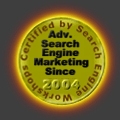 Look how old this is!
Look how old this is! I post at SearchCommander.com now, and this post was published 18 years 4 months 10 days ago. This industry changes FAST, so blindly following the advice here *may not* be a good idea! If you're at all unsure, feel free to hit me up on Twitter and ask.
From a site visitor perspective, of course it should look professional, and be functional and easy to use, but what about for the administrator or site owner that needs to maintain it? What would make it perfect for them?
Host anywhere
In their case, the perfect website would not be dependent on where it’s hosted, nor would it be dependent on a certain web designer to be able to easily add or change content.
Easy to Edit
A perfect website would be accessible by the site owner from any computer in the world, to add and edit content as they wish without having to own expensive software, or have a computer science degree.
Scalable
A perfect website would be able grow with a business, and be able to incorporate things later that may not be needed in the beginning, like a shopping cart, a forum, live chat, contact forms, surveys, audio, video, or anything else the site owner may desire.
A perfect website would be built with the search engines in mind, knowing that their future may depend on it.
Search Engine Friendly
In keeping with the search engine friendly best practices, every time a new page is added, a unique and page specific title tag would be automatically generated.
The description tag too, would be completely unique, and automatically come from the first 150 characters of text on the new content page.
Since a header tag and keyword tags are a part of every good webpage found in the search engines, those two items would also be automatically generated with no extra effort given by the page author unless they wanted to.
In a perfect world, content could even be added to this site using RSS feeds that come from other subject relevant websites. Naturally, any new content created on this perfect website would automatically generate its own RSS feed, for users to subscribe to and other websites to display on their sites.
Automatic Notification
What if every time a new page were created, an XML site map could be automatically generated and zipped, then Google were to be pinged to come get it, how cool would that be?
At the same time Google were to get pinged, what if dozens of news services too, could be automatically notified new content had been added to the website so that they could come visit and index it immediately.
Content and Design Separated
The perfect website would also use CSS, and keep the content completely separate from the design. This would allow for easy backup, and even more important, allow for easy design changes, done literally within seconds.
Open Source
Of course a perfect website wouldn’t cost a fortune either. In fact, if it were perfect, then it would be free, and even supported by a community of thousands of designers and developers.
WordPress
Until now, this wish list of things that a perfect website should have just wasn’t realistic. While all these things might take place individually with the proper systems in place and a lot of effort, there really hasn’t been an all-in-one solution that could please nearly everyone.
Now, however, with the recent upgrade of WordPress 2.1 and the built in ability to use a static page for your homepage, there’s no reason to keep dreaming.
Word press software is free, and if you’re a do it yourself type, a WordPress tutorial program is available from Sherman Hu, one of the top WordPress authorities in the world.
The tutorials are excellent (that’s why I’m an affiliate), and can take you start to finish, through installation and customization, as well as the code modifications for search engine friendliness. If you’re not a do it yourself type, then that’s why I’m here.
WordPress really isn’t just blog software anymore…it’s how you make the perfect website!




















thanks to this guideline..
i’ll treat this as a factor for making m website projects…
thanks
Another factor is ‘easy to update.’ With so many security and hacks out there, it seems that sites need to be updated with new code quit frequently. WordPress has a nice auto-update feature but Drupal does not. When you’re on a Drupal platform, you’ll have to hand-update each site with the ole’ copy and paste routine. Then you have to remove the default ROBOTS.TXT from the update or you’ll lose any 301’s or pages that you didn’t want indexed through ROBOTS.
I’d suggest using WordPress if auto-updating the code is something you value.